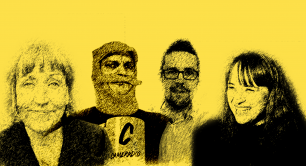The Feeling's Mutual: 'If these groups dissolve they haven't failed.'
Mutual aid means that we look out for each other: you support me and I support you. In the wake of Covid-19, thousands of new groups have been set up on these principles. But is there a danger of losing the 'mutual'? In this new podcast series – The Feeling's Mutual – Bob, Maff and guests discuss, and offer their potential solutions.

Love podcasts? Don't miss out on ours! Catch up on all our podcasts and subscribe free on Apple Podcasts, Spotify or Soundcloud.
In the latest episode of our podcast series, co-hosts Bob Thust and Maff Potts are joined by Thomas Waring of Macc, which supports the voluntary sector in Manchester, and Amardeep Dhillon, London bar tender, journalist and self-confessed ‘rabble rouser’.
The debate is centred around informal groups engaging with formal institutions, delving into the good, bad and ugly of informal and formal mutual aid. “Mutuality is this thing that’s fuelled by connection, by opportunities to connect, and that can be supported in the right ways and with the understanding of power, through some formalised groups and through informal connections as well,” says Bob.
After the recent publication of a report by Danny Kruger MP, discussion in this episode is politically charged. With general agreement the report gives a lot of hope, but the group believes its limitations are clear. Tom comments: “It’s basically saying we’re going to accept mutual aid as long as it’s not challenging the normal order of things.”
It’s basically saying we’re going to accept mutual aid as long as it’s not challenging the normal order of things
In conclusion, Amar argues that relationships forged will continue to thrive irrelevant of the formality of mutual aid: “Working class, BAME, trans, queer communities have always had what we describe as mutual aid but never in that language. They’ve always shared childcare, they’ve always done the shopping for one another – you have to when you’re at these axis of oppression under capitalism I’d argue. Whether or not mutual aid in the way that we’re discussing it is a relevant topic one year from now – the community bonds and the levels of engagement it has given rise to – those are really powerful and those aren’t going to go away no matter how co-opted various groups get by the state, funding, by the charity sector.”
|
Recommended reading The recent report published by Danny Kruger MP, which is heavily referenced in the podcast and attempts to “set out a vision for a more local, more human, less bureaucratic, less centralised society”:
Amar Dhillon’s recent Red Pepper article:
|



